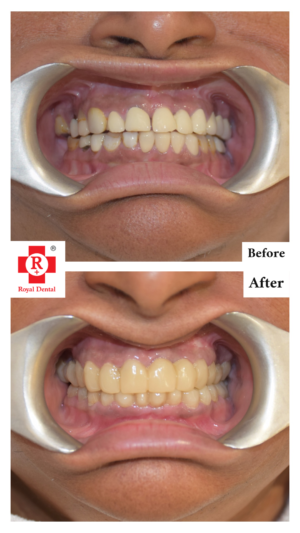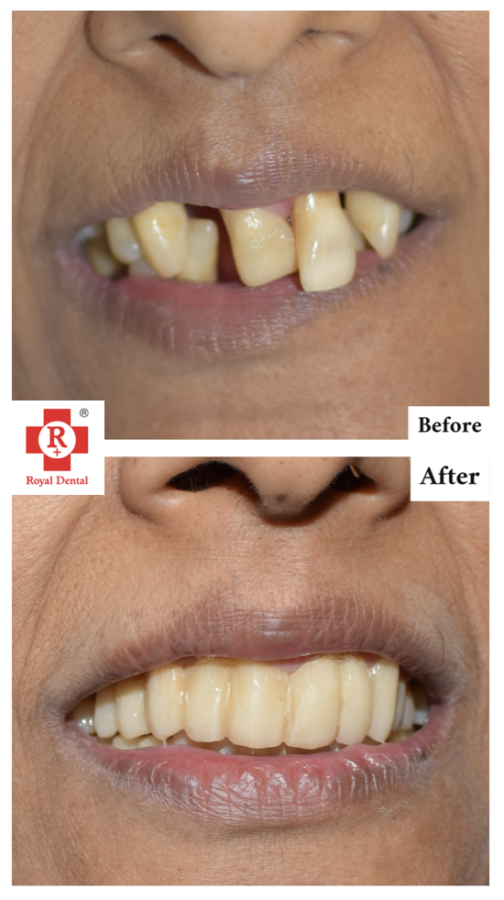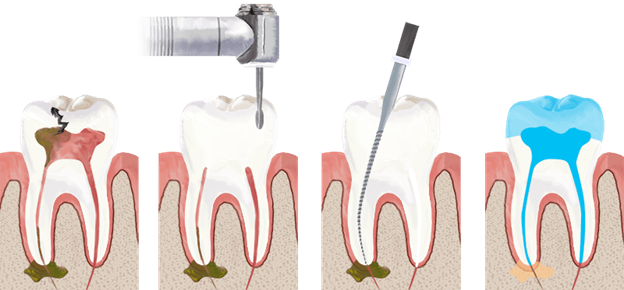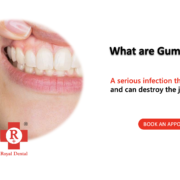Maintaining good oral health is crucial for a healthy life. However, sometimes we may face issues with our teeth that require specialized care. Root Canal therapy is designed for treatment of problems with tooth root and pulp of the tooth. It is an effective treatment option that can save a damaged or infected tooth. In this article, we will explore the success rate of root canal therapy and why you should trust Royal Dental Clinics for this procedure. In this article, we will explore the truth about root canal therapy and why it is a reliable option for those suffering from tooth pain or infection. We will debunk common myths surrounding the procedure and provide you with the facts you need to make an informed decision about your oral health.
What is Root Canal Treatment?
When the inside of a tooth becomes infected or inflamed, it can lead to severe pain and discomfort. In these cases, a root canal may be necessary to save the tooth. It is a dental procedure that involves removing the infected or inflamed pulp from the inside of a tooth and replacing it with a filling material. The procedure is performed under local anesthesia and is relatively painless.
During a root canal, the dentist will make a small hole in the tooth to access the pulp chamber. The pulp is then carefully removed using specialized tools. After the pulp is removed, the root canals are cleaned and shaped, and a filling material is placed inside to seal the tooth. In most cases, a crown or other type of restoration is placed over the tooth to protect it from further damage. It is important to talk to your dentist to understand the benefits and limitations of different cosmetic dentistry procedures, and to determine if root canal is right for you.
Why is Root Canal treatment necessary?
Root canal therapy is necessary when the pulp inside a tooth becomes infected or inflamed. This can happen for several reasons, including deep decay, repeated dental procedures on the tooth, or trauma to the tooth. If left untreated, the infection or inflammation can spread to the surrounding tissues and cause further damage.
Symptoms of an infected or inflamed pulp include severe toothache, sensitivity to hot or cold temperatures, swelling, and tenderness in the gums. If you experience any of these symptoms, it is important to see a dentist as soon as possible to determine if it is necessary.
To know more read on here.
Myths and Misconceptions Root Canal
Myth #1: Root canals are extremely painful. While it is true that root canal therapy was once a painful procedure, modern techniques and anesthesia have made it much more comfortable. Most patients report little to no pain during the procedure and only mild discomfort afterward.
Myth #2: Root canals can cause illness. This myth originated from research done nearly 100 years ago that has since been debunked. There is no scientific evidence to support the claim that it can cause illnesses or diseases.

Myth #3: It’s better to just have the tooth extracted. While tooth extraction may seem like the easier option, it is generally not the best choice for long-term oral health. Removing a tooth can lead to problems with biting and chewing, shifting of surrounding teeth, and bone loss in the jaw.
Myth #4: Root canals take multiple appointments. In most cases, root canal therapy can be completed in one visit to the dentist. However, in some cases, additional appointments may be necessary to complete the procedure.
How Root Canal treatment works?
Pulp therapy works by removing the infected or inflamed pulp from inside the tooth and replacing it with a filling material. The procedure is typically performed under local anesthesia to ensure that the patient is comfortable and pain-free throughout the procedure.



Once the pulp is removed, the root canals are carefully cleaned and shaped using specialized tools. This ensures that all of the infected or inflamed tissue is removed from the tooth. After the root canals are cleaned and shaped, a filling material is placed inside to seal the tooth and prevent further infection. In most cases, a crown or other type of restoration is placed over the tooth to protect it from further damage. The restoration is designed to look and function like a natural tooth, so it blends in seamlessly with the surrounding teeth.
Success Rate of Root Canal Therapy
The success rate of pulp therapy is generally high. According to the American Association of Endodontist (AAE), about 95% of root canal treatments are successful. The success of root canal therapy depends on several factors, including the location of the tooth, the complexity of the case, the skill of the endodontist, and the patient’s overall oral health.
In most cases, the success of root canal therapy can be measured by the absence of pain and the preservation of the tooth. A successful root canal should relieve any pain or discomfort caused by the infected or inflamed tooth pulp, and the tooth should remain functional for many years with proper care. However, in some cases, a root canal may fail due to factors such as reinfection, inadequate cleaning of the root canal system, or a poorly placed restoration.
In these cases, re-treatment may be necessary to save the tooth. It is important to remember that while the success rate of root canal therapy is high, it is still a complex procedure that requires a skilled and experienced endodontist. Patients should also follow all post-treatment instructions and maintain good oral hygiene to increase the chances of a successful outcome.
Factors that affect the Success of Root Canal
Severity of infection or inflammation: The more severe the infection or inflammation, the more difficult it can be to completely remove all of the infected tissue.
Skill of the dentist: Pulp therapy requires a high level of skill and precision. The success of the procedure depends on the dentist’s ability to thoroughly clean and shape the root canals.
Post-treatment care: Proper post-treatment care is essential for the success of root canal therapy. Patients should avoid chewing on the treated tooth until the restoration is complete and should practice good oral hygiene to prevent further infection.
Benefits of Root Canal Treatment
Saves the tooth from extraction: Root Canal Therapy is a popular alternative to tooth extraction. It allows the patient to keep their natural tooth, which is generally preferable to an artificial one.
Relieves pain and discomfort: Root canal therapy can alleviate pain and discomfort caused by infected or inflamed pulp. This can improve the patient’s quality of life and overall oral health.
Restores functionality: Root canal therapy can restore the functionality of the affected tooth, allowing the patient to chew and speak normally.
Improves oral health: Pulp therapy removes the infection and inflammation from the tooth, which can prevent further damage to the surrounding teeth and gums. This can improve overall oral health and reduce the risk of future dental issues.
Cost-effective: Root treatment is a cost-effective treatment option compared to other dental procedures, such as tooth extraction or dental implants.
Aesthetically pleasing: After Root Canal Therapy, the tooth can be restored with a crown or filling, which looks and functions like a natural tooth. This can improve the patient’s confidence and self-esteem.
Choose Royal Dental Clinics for Root Canal Therapy?
Expertise: Our team of experienced dentists and endodontists has years of experience in performing Root Therapy. We have successfully treated many patients with varying degrees of dental issues, ensuring the best possible outcomes.
Advanced technology: We use state-of-the-art equipment and techniques to ensure that our patients receive safe, effective, and comfortable Root Therapy. Our technology and equipment make the procedure quick and precise.
Personalized care: We understand that every patient is unique and requires personalized care. We develop customized care plans for each patient based on their individual needs, ensuring the best possible outcome.
Follow-up appointments: We offer follow-up appointments to monitor the patient’s progress after Root Canal Therapy. This ensures that the tooth is healing correctly, and the patient is comfortable.
Comfortable and friendly environment: We understand that dental procedures can be stressful for many patients. That’s why we strive to provide a comfortable and friendly environment, ensuring that our patients feel relaxed and at ease during their Root Treatment.
Affordable prices: At Royal Dental Clinics, we offer it at affordable prices, ensuring that patients receive the care they need without breaking the bank.
What to Expect During Pulp Therapy?
Examination: Dr. Chamria will begin by examining your tooth and taking X-rays to determine the extent of the damage. He will then discuss the procedure with you and answer any questions you may have.
Anesthesia: Before the procedure begins, Dr. Chamria will administer local anesthesia to numb the area around the tooth. This ensures that you won’t feel any pain or discomfort during the procedure.
Cleaning and Shaping: Dr. Chamria will then make a small hole in the top of the tooth and remove the infected or damaged pulp from the root canals. The canals are then cleaned and shaped to prepare them for the filling material.
Root Canal Therapy is a common dental procedure that can help to alleviate pain and save damaged or infected teeth. Here’s what you can expect during your Root Therapy at Royal Dental Clinics, led by Dr. Chirag Chamria:
Filling: Once the canals are cleaned and shaped, Dr. Chamria will fill them with a special filling material and seal the tooth with a temporary filling.
Follow-up Appointments: After the procedure, Dr. Chamria will schedule follow-up appointments to monitor your progress and ensure that the tooth is healing properly.
Crown Placement: Once the tooth has healed, Dr. Chamria will place a permanent crown on top of the tooth to protect it and restore its function.
Common questions about Root Canal
Q: Is root canal therapy painful?
A: It is typically not painful, as it is performed under local anesthesia. Most patients report little to no pain during the procedure and only mild discomfort afterward.
Q: How long does root canal therapy take?
A: In most cases, it can be completed in one visit to the dentist. However, in some cases, additional appointments may be necessary to complete the procedure.
Q: How long does it take to recover from root canal therapy?
A: Recovery time varies depending on the individual and the severity of the infection or inflammation. Most patients can return to normal activities within a day or two.
Conclusion:
Root treatment is a technique that has a success rate of over 95%, making it one of the most successful medical treatments available. At Royal Dental Clinics, we place a high priority on the patient’s comfort and happiness and make use of cutting-edge technology and procedures in order to perform root canal treatment in a manner that is both safe and successful. Put your trust in us to offer the treatment you need for a pain-free and healthy smile.







You’ve made some good points there. I am glad that you just shared this helpful information with us. Thank you for sharing
dental clinic for kids